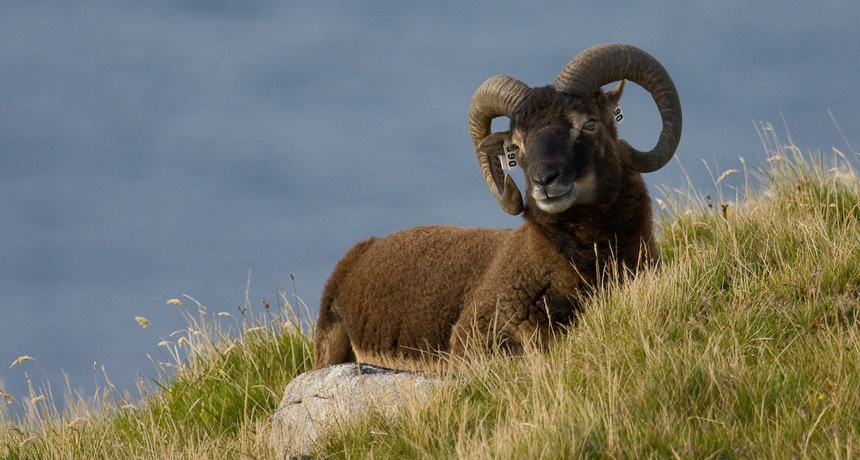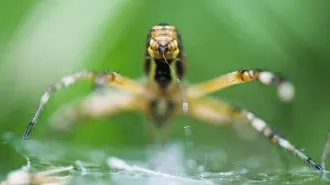
HORNY GENES This big-horned Soay ram will fight other males of his species for females on the St. Kilda archipelago during the spring rut. His ample horns, however, may not necessarily give him the best competitive edge, genetically.
Arpat Ozgul
- More than 2 years ago
Sometimes it pays to be mediocre. A new study shows that sheep with a 50/50 blend of genes for small and big horns pass along more of their genes over a lifetime than their purely big-horned brethren, who mate more often.
The finding offers rare insight into an enduring evolutionary paradox—why some traits persist despite creating a reproductive disadvantage.
The results, published online August 21 in Nature, reveal that while big-horned sheep mated most successfully each season, small-horned sheep survived longer. Rams who inherited one of each type of gene from their parents got the best of both worlds: they lived longer than bigger-horned sheep and mated more successfully than those with the smallest horns.
As a result, middle-of-the-road sheep passed on more of their genes over time. “They’re the fittest of them all,” says Jon Slate of the University of Sheffield in England, who led the study.
“This is a marvelous combination of using the most modern tools available to confirm classic older views of sexual selection,” says evolutionary geneticist Allen Moore of the University of Georgia in Athens, who was not involved in the study.
Traits such as bold peacock feathers and giant antlers evolved to garner the attention of prospective females and boost reproductive success. Yet if each generation of females continues to pick the most stellar males, Charles Darwin wondered, how do sub-par versions of a trait continue to persist? “It’s something that has preoccupied evolutionary biologists ever since,” Slate says.
Attempts to untangle the paradox have been confounded by the fact that most physical traits are thought to involve multiple genes. But in a population of sheep living on a chain of isolated Scottish isles, one gene bucks the trend.
“This one gene had such a massive effect on the size of the horns, and that was really unusual,” says evolutionary geneticist and coauthor Susan Johnston of the University of Edinburgh. Johnston discovered the gene, called relaxin-like receptor 2 (RXFP2), two years ago while analyzing the genetic fingerprints of nearly 500 Soay sheep. Domesticated in the Neolithic era and roaming wild for the last 4,000 years, the Soay sheep weigh just 45 to 80 pounds and stand 2 feet high. Scientists have intensively studied the colony in the St. Kilda archipelago since 1985.
Two different versions, or alleles, of the RXFP2 gene exist. One produces large, curled horns that work well in a fight, and the other produces small horns. Because sheep get a copy of the gene from each parent, males may possess two big-horned alleles, two small-horned alleles or one of each.
Sheep with two big-horned alleles have the largest horns, whereas sheep with one of each have smaller, yet substantial, horns. Rams cursed with two small-horned alleles develop either small curled horns or stubby protrusions called scurs that are worthless in competition. “They’re really quite pathetic,” Slate says.
Slate and his team analyzed samples collected from nearly 6,000 sheep on the island over three decades. The team correlated reproductive success and overall survival with the type of horn gene passed down with each generation.
Though it’s unclear why small-horned sheep live longer, the authors propose that these sheep may prolong their survival by steering clear of confrontation. Rather than attempting to square off with larger-horned males, the sheep stuck with scurs lie in wait for unattended females. The opportunistic breeders manage to spread their seed while avoiding a losing battle. In contrast, the sheep with the largest horns must protect and defend multiple females over the course of the mating season —a violent and energy-consuming endeavor that taxes survival.
The concept of “heterozygote advantage”— when an animal benefits from having two different versions of a gene — isn’t new, Johnston says, but “it’s quite often overlooked, because there are just so few examples of it.” The gene that causes sickle cell anemia is one such example: People who carry one copy of the disease-associated allele and one healthy allele are resistant to malaria.
Editor’s Note: This article was updated on September 9, 2013. Corrections include the number of sheep the researchers acquired genetic fingerprints of (nearly 500), how large the sheep can grow (80 pounds), and the location of Sheffield (England). The description of the behavior of males with the largest horns during mating season was also clarified.







